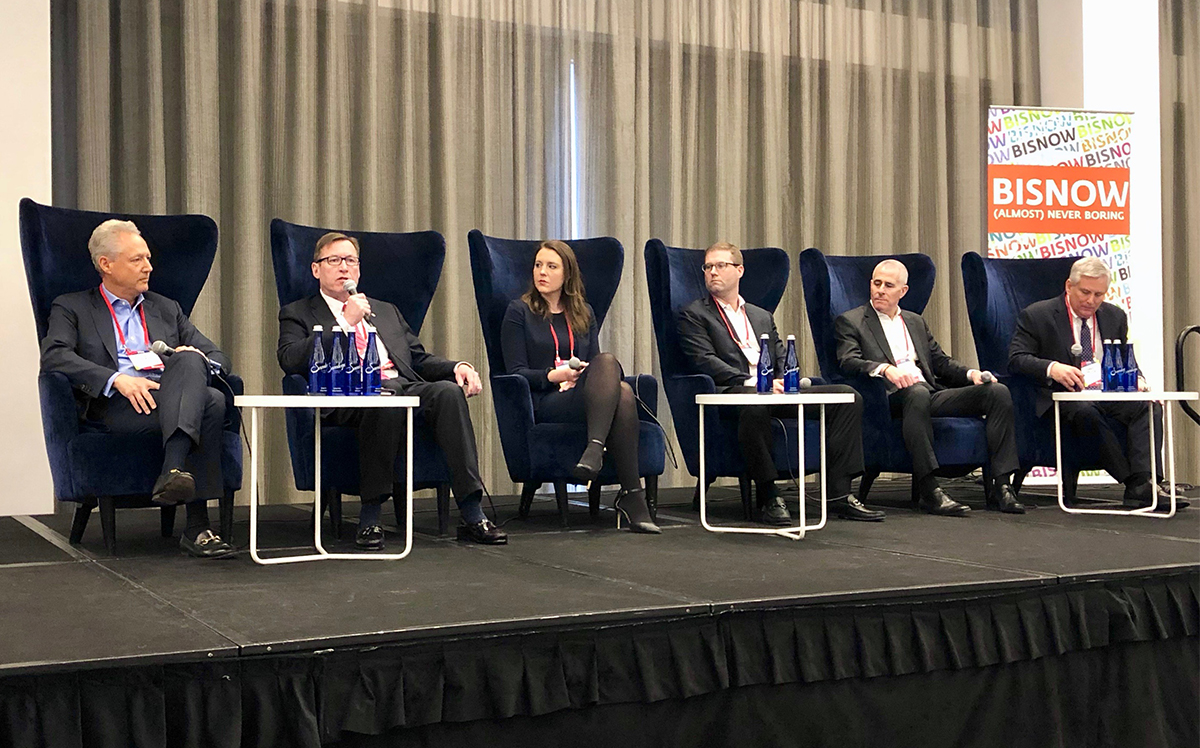The demise of big-box retailers like Carson’s and Toys “R” Us and the continued struggles of Sears have upended the business model for shopping mall owners, but companies like Tucker Development are betting the tumultuous transition will pay off in the long run.
Tucker is joining Seritage Growth Properties, the Real Estate Investment Trust spun off from Sears, to reimagine the mammoth superstores left vacant by the chain’s closure of its last two Chicago locations last year. Its proposed fix isn’t to bring in new retailers to replace the shopping experience neighbors had grown accustomed to there, but to add more neighbors instead, CEO Richard Tucker said at a Bisnow forum Thursday.
Converting shuttered stores into mixed-use developments “is not just economically a benefit for us as developers, but it’s also the epitome of one plus one equals three,” Tucker said. “The retail benefits the residential occupants, residential occupants benefit the retail, and it’s … become a cross-pollination where the retail becomes an amenity for the residential project.”
Tucker’s pending plans for the stores in Portage Park and Montclare echo a mantra ringing among nervous retail landlords, brokers and investors nationwide: It won’t be easy to fill the vacancies left by big closures, but those who can pull it off stand to see a payoff in the form of a larger pool of diverse users.
Simon Property Group spent $725 million last year redeveloping big box stores into hubs for apartments, fitness centers, medical offices, co-working spaces and more. The result was a 26 percent year-over-year spike in net income, while occupancy held steady around 96 percent.
“People are becoming much more comfortable owning multi-use assets,” said Joe Girardi, principal of investment sales for Mid-America Real Estate. “A lot of people we deal with are looking at buying shopping centers with densification opportunities, where they can add multifamily or a hotel to the site to further activate it.”
Breaking up superstores into clusters of smaller shops or restaurants can take considerable construction and leasing efforts, but it also gives landlords more negotiating power. Property owners can charge up to twice as much on a square-foot basis for foodservice tenants as they do for big box retailers, Tucker said.
While “insane” construction costs are making renovations “harder and harder every day,” the work is usually justified by the prospect of higher rents, said Stacy Short, regional leasing director for Retail Properties of America.
“When you can correct the rent for a big box tenant that was in there paying far below market and … get the right size, space and uses, it helps drive the quality and value of that center,” Short said.
The explosion of e-commerce, which now accounts for some 10 percent of national retail sales, has tamped down the supremacy of high-profile retail destinations like the Magnificent Mile, where vacancy ballooned from 5 percent in 2015 to 12 percent three years later. But Internet retailers are also buying back into brick-and-mortar, with companies like Warby Parker and Bonobos setting up physical presences in some neighborhood corridors.
Retail vacancy is on the decline across the region, pushed by frenzied leasing activity in burgeoning pockets like the West Loop. The overall vacancy rate for the metro area slid to 6.2 percent last year from 6.6 percent one year earlier, according to Marcus & Millichap.
But the local specter of rising commercial property taxes is making it harder to fill empty storefronts with national retailers, brokers and other industry observers said Thursday.
The ongoing race for mayor has drawn out proposals for a hike in taxes on high-end real estate transfers, and large property owners are bracing for sharply higher tax bills under new Cook County Assessor Fritz Kaegi.
Girardi said Chicago retail properties are “trading at a discount” compared to similarly-sized American markets because of political uncertainty at the local, county and state level.
John Melaniphy, the director of economic development for the town of Wheeling in Lake County, said some companies set a hard-line policy of “ABC: Anything but Cook.” But others, seeking employees in a tight job market, can’t afford to keep that policy.
“The thing we have going for us is our labor force,” Melaniphy said. “It’s a fact of life … retailers who want to serve this area are going to have to be in Cook County and pay those property taxes.”
